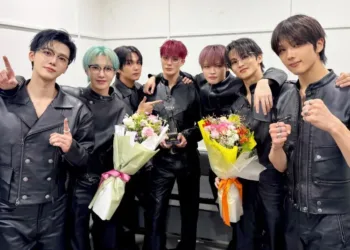From his breakthrough as the painfully shy Todd Anderson in Dead Poets Society to his recent chilling turns as a serial killer in The Black Phone, Ethan Hawke has built one of the most diverse and compelling filmographies in contemporary cinema. Spanning over three decades, his career showcases remarkable range, intellectual depth, and an unwavering commitment to authentic storytelling that has made him one of Hollywood’s most respected character actors.
Table of Contents
The Foundation: Dead Poets Society and Early Breakthrough
Ethan Hawke’s journey to stardom began at just 18 years old when Peter Weir cast him as Todd Anderson in the beloved 1989 film Dead Poets Society. Playing the painfully shy student who slowly emerges from his shell under Robin Williams’ inspiring English teacher John Keating, Hawke delivered what Variety called “a haunting performance” that established his signature sensitivity and emotional intelligence.

Breakthrough Performance Analysis
| Aspect | Impact | Legacy |
|---|---|---|
| Box Office Success | $235 million worldwide | Remains Hawke’s most commercially successful film |
| Critical Reception | BAFTA Award for Best Film | Launched Hawke’s reputation for nuanced performances |
| Career Influence | Academy Award nomination for Best Picture | Convinced Hawke to pursue acting over writing |
The film’s massive success opened doors that would define Hawke’s career trajectory. As he later reflected, “I didn’t want to be an actor and I went back to college. But then the [film’s] success was so monumental that I was getting offers to be in such interesting movies and be in such interesting places, and it seemed silly to pursue anything else.”
The Linklater Collaboration: Before Trilogy Excellence
Ethan Hawke’s most celebrated work arguably comes from his collaboration with director Richard Linklater in the Before trilogy. Starting with Before Sunrise (1995), continuing through Before Sunset (2004), and concluding with Before Midnight (2013), these films showcase Hawke’s evolution as both actor and co-writer alongside Julie Delpy.
The Before Trilogy: A Masterclass in Character Development
The trilogy follows Jesse and Céline’s relationship over nearly two decades, with each film capturing different stages of love, commitment, and human connection. Hawke’s performance grows more sophisticated with each installment, reflecting both his character’s maturation and his own development as an artist.

Before Sunset earned Hawke his first Academy Award nomination for Best Adapted Screenplay, while Before Midnight brought him a second writing nomination. The naturalistic dialogue, much of it improvised by Hawke and Delpy, creates an authentic portrait of modern romance that critics have called one of cinema’s greatest trilogies.
Genre Versatility: From Sci-Fi to Crime Thrillers
Gattaca (1997): Dystopian Drama
In Andrew Niccol’s prescient science fiction drama Gattaca, Ethan Hawke portrays Vincent Freeman, a naturally conceived man fighting against genetic discrimination in a future society. His performance anchors this intelligent exploration of eugenics and human determination, proving his ability to carry complex conceptual material.
Training Day (2001): Supporting Actor Excellence
| Achievement | Details | Significance |
|---|---|---|
| Academy Award Nomination | Best Supporting Actor | First Oscar nomination for acting |
| Co-star Recognition | Denzel Washington won Best Actor | Elevated both performances |
| Critical Impact | Roger Ebert praised Hawke’s “convincing” performance | Established dramatic credibility |
Opposite Denzel Washington’s corrupt detective, Hawke plays rookie cop Jake Hoyt with a perfect balance of naivety and growing awareness. The role demonstrated his ability to hold his own against powerhouse performers while maintaining his character’s moral center.
The Character Actor’s Evolution: 2000s-2010s
Reality Bites (1994): Generation X Voice
As Troy Dyer in Ben Stiller’s Reality Bites, Ethan Hawke became a defining voice of Generation X cinema. His portrayal of the directionless slacker who “mocks the ambitions of his girlfriend” resonated with audiences navigating post-college uncertainty. Roger Ebert noted how “Hawke captures all the right notes as the boorish Troy,” while The New York Times praised his “subtle and strong performance.”
Boyhood (2014): A Decade-Long Commitment
Richard Linklater’s groundbreaking Boyhood, filmed over 12 years, showcased Ethan Hawke as Mason Evans Sr., an initially irresponsible father who evolves into a caring, insightful parent. This remarkable project earned him his second Academy Award nomination for Best Supporting Actor and demonstrated his commitment to innovative filmmaking.

Recent Masterworks: Mature Performances
First Reformed (2017): Career-Defining Role
Paul Schrader’s First Reformed features Ethan Hawke in perhaps his most powerful performance as Pastor Ernst Toller, a tormented minister grappling with faith, environmental concerns, and personal tragedy. Critics hailed it as one of his career-best performances, with the film earning widespread acclaim for its mature exploration of spiritual crisis.
Contemporary Villain Turns
Recent years have seen Ethan Hawke embrace darker roles with remarkable success:
| Film/Series | Year | Character | Genre |
|---|---|---|---|
| The Black Phone | 2021 | The Grabber | Horror Thriller |
| Moon Knight | 2022 | Arthur Harrow | Marvel Series |
| The Northman | 2022 | King Aurvandil | Viking Epic |
His portrayal of The Grabber in The Black Phone marked a significant departure, with Hawke admitting he’d previously avoided villain roles, fearing audiences would “not unsee” the darkness. His chilling performance proved his range extends far beyond sensitive, intellectual characters.
The Multifaceted Artist: Beyond Acting
Ethan Hawke’s artistic pursuits extend well beyond performance. As a director, he’s helmed films including Chelsea Walls (2001), The Hottest State (2006), and Blaze (2018), as well as the acclaimed HBO Max documentary series The Last Movie Stars (2022). His literary work includes four novels, with A Bright Ray of Darkness (2021) earning particular critical attention.
Theater and Writing Contributions
Hawke co-founded the Malaparte Theater Company in New York City in 1991 and has earned Tony Award nominations for his Broadway work. His commitment to live performance reflects his belief that theater is his “first love” and a place where he feels “free to be more creative.”
Career Philosophy and Selection Process
Throughout his career, Ethan Hawke has consistently chosen projects that challenge both himself and audiences. His collaboration with auteur directors like Richard Linklater, Paul Schrader, and Robert Eggers demonstrates his preference for character-driven narratives over commercial blockbusters.

His approach to role selection reflects a deep understanding of storytelling craft. Whether portraying a shy student in Dead Poets Society, a desperate father in Boyhood, or a conflicted pastor in First Reformed, Hawke brings intellectual curiosity and emotional authenticity to every performance.
Looking Forward: Recent and Upcoming Projects
Ethan Hawke continues to evolve as an artist with diverse upcoming projects. The Black Phone 2 (2025) sees him reprising The Grabber, while Blue Moon showcases his range as Broadway lyricist Lorenz Hart. The FX series The Lowdown promises another compelling television performance, demonstrating his continued relevance across all entertainment mediums.
His recent work in Leave the World Behind (2023) and voice work as Batman in Batwheels shows an artist unafraid to explore new territories, whether in prestige drama or children’s animation.
The Legacy of Authentic Performance
What distinguishes Ethan Hawke from his contemporaries is his unwavering commitment to authentic performance over star persona. From the sensitive teenager in Dead Poets Society to the complex adult characters of his recent work, he’s built a career on truth rather than image.
His influence extends beyond individual performances to his role in championing independent cinema, collaborative filmmaking, and artistic integrity. Through his work with directors like Linklater and his own directorial projects, he’s helped preserve space for thoughtful, character-driven storytelling in an increasingly commercial landscape.
As Ethan Hawke continues into his sixth decade of life and fourth decade of filmmaking, his career stands as a testament to the power of choosing substance over spectacle, ensuring his place among cinema’s most enduring and respected artists.
Read More: Gen V Season 2 Finale Countdown: Complete Release Schedule and What’s Next for The Boys Spin-off
FAQs
What was Ethan Hawke’s breakthrough role?
Ethan Hawke’s breakthrough role was Todd Anderson in “Dead Poets Society” (1989) when he was just 18 years old. The film’s massive commercial success ($235 million worldwide) and critical acclaim launched his career and convinced him to pursue acting over his original ambition of writing.
How many Academy Award nominations has Ethan Hawke received?
Ethan Hawke has received four Academy Award nominations: two for Best Supporting Actor (Training Day in 2001 and Boyhood in 2014) and two for Best Adapted Screenplay (co-writing Before Sunset in 2004 and Before Midnight in 2013).
What is Ethan Hawke’s most critically acclaimed performance?
Many critics consider his role as Pastor Ernst Toller in “First Reformed” (2017) to be his most critically acclaimed performance. The film showcased his ability to carry complex, mature material and earned widespread praise for its exploration of faith and environmental themes.
Has Ethan Hawke worked as a director and writer?
Yes, Ethan Hawke is also an accomplished director and writer. He has directed films including “Chelsea Walls,” “Blaze,” and the documentary series “The Last Movie Stars.” He’s also published four novels and co-wrote several screenplays, earning Oscar nominations for his writing on the Before trilogy.
What recent projects showcase Ethan Hawke’s range as an actor?
Recent projects demonstrating his range include playing the villain Arthur Harrow in Marvel’s “Moon Knight” series, the serial killer The Grabber in “The Black Phone,” and voicing Batman in the children’s animated series “Batwheels,” showing his versatility across genres and mediums.








